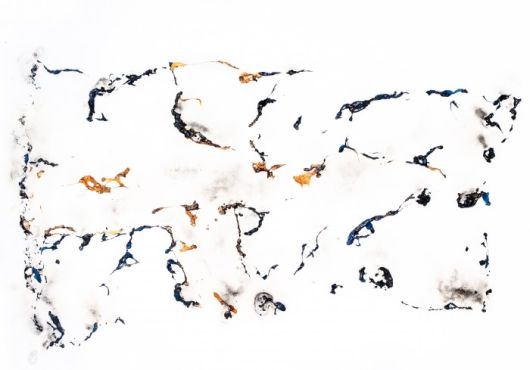 THE WORLD
THE WORLD In Which There Are Things I Have Never Liked Explaining
 Monday, December 9, 2013 at 11:37AM
Monday, December 9, 2013 at 11:37AM 
What We Think About Them Leaving
by CARMEN AIKEN
Three things happened in quick succession, two in perfect order, one lagging. In late fall, my brother drives my parents to the airport where my father boards a plane to interview for a job. On the way driving to his afternoon classes he is blindsided by a woman turning right on red. When he calls me at my job, I’m between client calls and can only make out hysteria and suburban traffic. He hangs up and in a panic I kill my phone line, run to the bathroom and call him back to ascertain how fast I need to be by his side. Later that night I catch a ride to the suburbs and buy him dinner, have a few beers. I ride back out on the train that weekend and we talk on the way to pick up my parents. We plan our questions, we resolve to listen.
The second thing is that afternoon the parents ask us what we think about them leaving the country and the question is their decision and our answer. Over the next few hours of contracts and timetables, distance in miles and wine (me, mostly) we make the joke that at least the car, totaled, is one thing they will not have to get rid of.
The third thing. I break up with the boy who I've been spring-summer-no-pause-in-love-with. It could be called mutual: he didn't know how to leave me. I believe now, and think I knew it then, that if I had to start letting things go he had to be one of the first things to try and release.
+
We controlled our reaction and were far from indifferent, although the components were not unfamiliar. Parents on their way to some idea of retirement, a job offer, children with their own jobs and beers and the ability to vote. And so? So Sweden? It could be Houston, Bogota, Mumbai, anywhere. The parents returned from a visit, which was really an interview, which was really an almost-yes and sent a missive through the satellites: When u free? Need to talk.
Talking. Constantly, more than in years, as if each word would fit every synapse firing, each question could find its way to answer. After the ride back from the airport, parents spilled maps, postcards, brochures, two candy bars from Heathrow. The questions came down to needs and wants and expectation. Do you want to work for these people? (Yes). Will they pay you money you feel is fair as a payment to work for them? (Yes). Did you like Sweden? (Yes). When will you have to leave? (Soon. Sooner than anyone thinks, soon sans holidays, soon sans time, always the loss of time.)

Do you want to go? An answer read in the excited face of a father who may or may not have faced redundancy in a changed world and who has worked for the same company for longer than the children have been alive, or the marriage. This is the father telling stories and making plans from percolated anticipation on a plane or taxi or train ride: a trip to Spain, a birthday in Copenhagen, a father who went from the Air Force to school to job to marriage to children and what lasted was travel, was work that took him so many places. This is a joy impossible to qualify or verbalize. This is a face and a quiet.
And none of this worked without wife and mother. What are the reasons people stay together for thirty years, when one person is constantly back and forth in other lands? What is the reason two people decided to join when mother has taken off from the nest she grew up in to live a year in a fascist country four thousand miles south? What is the reason she says yes when a proposal comes in airmail with a bouquet of flowers? This is a hardiness, an inquisitiveness, a need to move, keep moving, keep going and finding written into some vein.
The honesty of the afternoon peaked with: if the world were different, and secure, and children older and tied to a career or person or children of their own or land, would there still be a life away from them in a land 4,250 miles away? And the answer: yes, we would go in a heartbeat, yes. Yes yes yes. Then go, the children say. Go.
+
The house had to go. Not everything, not all at once. My mother would stay for another half a year or so to sort it out with my brother and I. The Swedish company would pay for a cargo container of furniture, mementos, a bicycle, for movers to pack and send it across the ocean.
In the beginning I tried to imagine Sweden and the apartment their bed, sofa, kitchen table, pots and pans and silverware would land in. I’d traveled to so few places and could only create a generic European city from my study abroad months in London or people who populated those streets as tall, pale, androgynous electronic musicians.

But the work of the move threw me out of my family’s future into too much of the recent past. I returned from visits on the weekend laden with backpacks and paper shopping bags of adolescent detritus, college paperbacks from the 1970s, stuffed animals. The weekend before my father officially moved, six weeks to Christmas and his garage full of mechanical wares and used chemicals cackling at its corpulence, I cried morosely in my junior high bedroom over a pile of book reports. My father threw up his hands and my mother told him to leave me be.
+
At the time I worked as a virtual personal assistant and receptionist for a niche startup, whose clients were middling consumer attorneys across the United States. Consumer attorneys meant they trucked in the bad luck of humanity, a way to play the last hand via the legal system. This is just to explain I fielded phone calls and correspondence from thousands of citizens bankrupt, foreclosed on, wounded in surgery, dividing their possessions in dissolving marriages, drunk, arrested. It was a job I held for two years, which seemed miraculous and was the refrain of the burgeoning decade: desperate searches for work, low pay, relief. When I try and tell about this to people who have not known me very long I say, I wanted to go to law school. Like a few other tales I have said it so often it has now become true.
I felt lucky then but also miserable and stuck and all of it coagulated into months of thinking I could separate my work from my life. In the beginning of my job I worked a night shift (lawyers in California also need girl fridays) and spent much of my non-work hours biking, cooking, reading books, trying to write. When I worked Midwest business hours I slipped into the hazards of dating, into whiskey, into trying to write with some wine, but then just the wine.
After two years of incentives, shiny middling-startup company culture made up of beer and happy-hour parties, three rounds of mass layoffs and every day full of sobbing or cursing clients, I was out. I interviewed at startups, bars, a couple nonprofits: in general anything directed at young adults across the city for months. I’d go to work full of anticipatory rage and cold biking fury and take weekends to ride out on the Blue Line to the suburbs.

Over Thanksgiving, one family member down, I cleared through wine and bits from the liquor shelf that was to vanish before next summer (with the exception of several fine bottles of Venezuelan rum, still in storage to this day). I felt extraordinarily weepy, worn down with winter too soon, with the house emptying about us. At one point before I pulled the turkey breast out of the oven, my brother confronted me with my bitterness and the lashing that came with my tongue running off the wine, told me I was worth more.
By January, a clear and cold winter that year, I quit the job, gave them ten days notice, and applied to graduate school. In March I found work at a local bike shop, two days after I traveled to Washington D.C. with my mother to the Swedish Embassy to pick up her paperwork. That June I jogged out the doors of the store to drive her car to my grandparents house a week later, where it would sleep until whenever they returned or it had to go somewhere else. The last night we stayed in the house, before it filled with open house furniture and flowers, I tried to sleep in the middle of the first-floor living room on the laminate floor I’d put in a few years prior, staring at the swingset through the glass door.
+
I don’t tell many people, right away, about my parents. I learned because after starting new jobs and paths in life where after the obligatory inquisitions about origins, I say I grew up in a nearby suburb but my parents live across the ocean. This is met with a thousand things and I’ve never liked explaining. My reticence has graciously allowed most people to forget and so whatever version of this life I live with my family now cast across countries (as has been true for many limbs of my ancestral tree) is mine. My brother shares the same sentiment.
For so many months that year, though, the anger I felt lapped around the bits of mantle built of (including, but not all): feeling like a dutiful heir, channeling all the others who have loved their families even when they go to frontiers or borders or jobs, the fear of someone who has kept rebellion to individual wounds secret to try not to burn my family’s bridges or barns, questions of pricing air travel.

What I have settled on is that I came to exist because of persons who decided to leave where they came from. The past century drastically changed how we view place, how we can be (or not be) tied to it, the ability to move rapidly. I learn this over and over again in graduate school, how everywhere is anywhere. I could say its true, but as anyone who has ever been in a long distance relationship or unable to attend a wake or caught in a land with too-fast tongues can tell, this has changed less than we think. My parents do not live around the corner or down the train from me and no skype chat can change that, but we make it work. The contents of my suitcase on my first visit where I joked to my brother, “I’m a space smuggler, kid,” included corn tortillas, hot sauce, harina pan and hibiscus tea.
+
Moving is its own unique exhaustion and tedium, which is why everyone hates even talking about it. I didn’t even have to move. Before then I’d gone from Midwest to Coast, Coast to Island, Coast to Midwest, city flat to city flat, and at that point three times over three years.
My brother and I reveled in ditching detritus in our old high school’s dumpster in the dark, hoping our parents’ property taxes would cover whatever apparent lack of education we received. Our friend who worked at a hardware store told us the store had a legal obligation to dispose of used paint and people often ditched cans of it on their curb. We loaded my brother’s small car’s trunk with all the paint I’d used to redo their garage door, bathroom, kitchen and counted down ONE TWO THREE!, running outside like it was a traffic game, ditching the boxes full of cans and drove away, exhilarated and guilty and sad.
Even with the housing market and the numerous families fleeing the suburbs, the house sold by the end of the summer. My brother lived nearby, for at time, and would ask if I wanted to drive by. I have not seen it since.
+
So we got rid of or packed up: my mother’s piano from her double-wide childhood my grandparents drove up to her first residence after she married in their truck (in storage), tax documents and medical files (shredded and recycled), metal tools, ladders and furniture (picked up by men at dawn from the curb), photo albums of the dead, diplomas, graduation photos (in storage). This list is why I find it less than useful to explain what happened in the move. Most of us will understand this sooner or later.
But at the time it seemed impossible for anyone to understand, which made my own acceptance and agreement that much harder to hold on to.
Incredulity. From everyone. Faces slackened or eyes widened, and they repeated, “SWEDEN?” How was that possible? Half the people who heard this understood the implications of a farther side of the world, the other half tossing off, “Oh, cool” as though retirement meant moving into a condo somewhere warmer. Fact about Sweden: it is comparable in climate to the Midwest. The incredulity comforted. The telling of the same telling over, and over, and over. Everything must go, and the house must sell. There was a job there, and reindeer, and a transparent government.
But the anger. No more possibilities to take up heroin or join the Peace Corps or move to Paris. And anger when people didn't understand the bewilderment. Why did people keep mentioning no one died and no one disowned anyone? Why are those questions thrown into the air? Those are too many words. Who can go to the hospital if there's an accident? Who can come for a Thanksgiving meal? What is a Thanksgiving or Christmas or Easter meal? Does anyone really enjoy turkey breast? Will they enjoy turkey or tortillas or pizza if they chose to spend time with family near or far, or chose to not see anyone at all?
I have never professed to enjoy change. I work hard to present the idea of myself as laid-back, able to turn on a dime. It may not make sense but I know it comes from my dislike of making choices, of how growing older has taught me how choice is structured, how few of them actually exist for so many people in this day and age. Then I didn't want those possibilities which was how I ended up where I was: accepting the work that came to me, the reverberations of the break-up, driving down suburban streets to second-hand stores with a backseat full of my family's possessions. Mostly it was how easy to feel angry at whatever passed that seemed not the way it was supposed to be. That was my choice and it was no choice at all.
But it was finally on some days staring at the top of a building in an alley downtown, the smoke curling into the new winter blue. And knowing how beautiful the top of that building was and how beautiful the tops of buildings must be in all of the other places to live.
Carmen Aiken is the senior contributor to This Recording. She is a writer living in Chicago. She last wrote in these pages about the difference. You can find her website here.
Photographs by the author.

"Things I Don't Remember" - Ugly Casanova (mp3)
"Hotcha Girls" - Ugly Casanova (mp3)

 carmen aiken,
carmen aiken,  sweden
sweden 
































